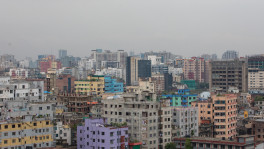Rohingya influx put Cox's Bazar biodiversity at risk: PM
Hundreds of acres of hills and forests were razed down to make camps and facilities for the Rohingyas

Prime Minister Sheikh Hasina has said the biodiversity of Cox's Bazar area is at risk due to the critical impact of one of the world's biggest influxes of above 700,000 Rohingyas.
The premier made the observation in her inaugural speech of the ‘Global Commission on Adaptation’ at Hotel Intercontinental in the capital on Wednesday.
"Hundreds of acres of hills and forests were razed down to make camps and facilities for the Rohingyas in Ukhia and Teknaf upazilas of Cox's Bazar, threatening the biodiversity," she said.
"The Bangladesh government has approved of Bangladesh Delta Plan 2100 (BDP 2100) in 2018 with the aim of achieving 'safe, climate resilient and prosperous Delta' by 2100."
“We have built tolerance as part of our strategy to tackle the effects of climate change. We will present our knowledge regarding this. Bangladesh faces the highest risk of natural disasters caused by climate change. The country has already seen many disasters in the last few decades,” said the premier.
“338 Mujib Kellas (forts) were built for protection against natural disasters. The government has built a total of 3,861 cyclone centres and another 1,650 are under construction. These are versatile cyclone centres,” she said.
Hasina said her government wants to make ‘Green Belt’ in coastal areas within 5 years to resist tidal waves.
“Our scientists and inventors have invented many technologies that can shield rice natural disasters. Those are salinity-resistant rice, water-resistant rice and drought-resistant rice.”
The premier said the government would make ‘floating gardens’ to grow vegetables in haors, and southern and coastal areas to ensure food security.
Hasina also said initiatives have been taken to ensure that every citizen will plant at least three trees to keep the environment green.
She also highlighted the importance of Bangladesh’s experience and expertise for the Global Commission on Adaptation (GCA).
The government of Bangladesh wants greater recommendations from the GCA to help the country get global support to fight problems rising over the decades following climate changes.
Marshall Island President Dr Hilda Heine, incumbent GCA chair, former UN Secretary General Ban Ki-moon, and CGA co-chair Dr Kristaline Georgieva attended Wednesday’s meeting.
Foreign Minister Dr AK Abdul Momen, Environment, Forests and Climate Change Minister Md Shahab Uddin, Executive Director, BRAC and Commissioner, GCA Muhammad Musa, Chief Executive Officer (CEO), Global Commission for Adaptation Centre Dr Patrick V. Verkooijen, Executive Vice President and Managing Director, World Resources Institute Manish Bapna will also address the event.


 Keep updated, follow The Business Standard's Google news channel
Keep updated, follow The Business Standard's Google news channel
















